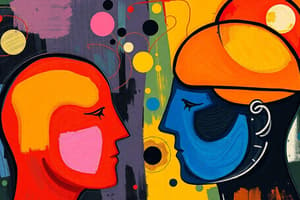Podcast
Questions and Answers
What are causal attributions?
What are causal attributions?
Inferences that people draw about the causes of their own behavior and the behavior of others.
Attributions can be which of the following? (Select all that apply)
Attributions can be which of the following? (Select all that apply)
- Internal or external (correct)
- Stable or unstable (correct)
- Specific or global (correct)
- None of the above
What do people with an optimistic explanatory style attribute negative outcomes to?
What do people with an optimistic explanatory style attribute negative outcomes to?
External, unstable, and specific factors.
What do people with a pessimistic explanatory style attribute negative outcomes to?
What do people with a pessimistic explanatory style attribute negative outcomes to?
What is the fundamental attribution error?
What is the fundamental attribution error?
How does culture affect the fundamental attribution error?
How does culture affect the fundamental attribution error?
What is the actor-observer effect?
What is the actor-observer effect?
What is self-serving bias?
What is self-serving bias?
What does the ultimate attribution error refer to?
What does the ultimate attribution error refer to?
What is the covariation model?
What is the covariation model?
What does consensus mean in the covariation model?
What does consensus mean in the covariation model?
What does consistency mean in the covariation model?
What does consistency mean in the covariation model?
What does distinctiveness mean in the covariation model?
What does distinctiveness mean in the covariation model?
When do people make an external attribution about another person's behavior according to the covariation model?
When do people make an external attribution about another person's behavior according to the covariation model?
When do people make an internal attribution about another person's behavior according to the covariation model?
When do people make an internal attribution about another person's behavior according to the covariation model?
What is the fundamental attribution error often exhibited as?
What is the fundamental attribution error often exhibited as?
What indicates that you are exhibiting the actor-observer effect?
What indicates that you are exhibiting the actor-observer effect?
What external causes might lead you to attribute your co-worker's dissatisfaction?
What external causes might lead you to attribute your co-worker's dissatisfaction?
Flashcards are hidden until you start studying
Study Notes
Causal Attributions Overview
- Causal attributions are inferences regarding the causes of one’s own and others’ behaviors.
- Attributions can be classified into internal (dispositional) and external (situational), along with stable vs unstable and specific vs global.
Optimistic vs Pessimistic Explanatory Styles
- Optimistic individuals attribute negative outcomes to external, unstable, and specific factors.
- Pessimistic individuals attribute negative outcomes to internal, stable, and global factors.
Fundamental Attribution Error
- This refers to the tendency to overestimate dispositional factors while underestimating situational factors when evaluating others’ behaviors.
- Cultural differences are evident; North Americans tend to make more dispositional attributions compared to Asian Indians, who lean towards situational attributions.
Actor-Observer Effect
- This effect highlights the difference in attributions for self vs others, where individuals attribute their own behaviors to situational factors while attributing others' actions to dispositional factors.
Self-Serving Bias
- When evaluating one’s own behaviors, individuals demonstrate self-serving bias by attributing success to internal factors and failures to external factors.
Ultimate Attribution Error
- This error is evident when attributing behaviors of in-group vs out-group members, often attributing in-group negative behaviors to situational factors and out-group negative behaviors to dispositional factors.
- This concept is often used to explain the dynamics of prejudice.
Covariation Model
- Attribution is influenced by three components: consensus, consistency, and distinctiveness.
- High consensus indicates others would behave similarly; high consistency indicates the individual typically behaves this way in similar situations; high distinctiveness suggests the individual behaves differently in other situations.
Application of the Covariation Model
- High consensus, consistency, and distinctiveness lead to external attributions for another person’s behavior.
- Conversely, low consensus, high consistency, and low distinctiveness suggest internal attributions.
Summary Notes on Attributions
- Fundamental attribution error involves overestimating personality traits and underestimating situational influences in others' behaviors.
- The actor-observer effect specifically addresses the differential attribution based on perspective; self behaviors are often attributed to context while others' behaviors are attributed to character.
- Applying the covariation model effectively allows for clearer understanding of how different factors inform attribution decisions.
Studying That Suits You
Use AI to generate personalized quizzes and flashcards to suit your learning preferences.




